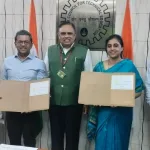A New Dawn in School Monitoring
As India aligns with the transformative vision of NEP 2020, the School Education Department of Jammu and Kashmir—under the insightful leadership of the Director School Education Kashmir (DSEK)—is reimagining academic monitoring. Moving beyond outdated, inspection-driven models, the new approach embraces mentorship, continuous feedback, and reflective dialogue. In Kashmir’s uniquely complex socio-political environment, this shift is more than administrative—it’s deeply human. Schools are no longer sites of scrutiny but spaces of learning, healing, and empowerment. By centering the learning-teaching process and trusting teachers as professionals, DSEK’s initiative marks a critical departure from compliance toward care. It reflects a commitment to turning monitoring into a shared journey of growth and inspiration—one that acknowledges challenges, honours resilience, and amplifies hope. This article reflects on the contours, challenges, and promise of this bold shift in the heart of Kashmir.
“Academic monitoring needs to be a reflective, learning-oriented, and continuous process rather than an episodic administrative activity.”
From Supervision to Surveillance
For years, school inspections in Jammu & Kashmir echoed colonial routines—focused on compliance, not learning. Inspectors prioritized paperwork over pedagogy, leaving teachers anxious and unsupported. Feedback lacked depth, and the rigid model ignored the region’s socio-political and climatic realities. As a result, inspections became checkbox exercises, stifling teacher agency and innovation. A shift toward mentorship and meaningful engagement is essential to bridge the gap between policy intent and classroom impact.
Aligning with Progressive Practices
The push for reimagined academic monitoring emerged from educators and policymakers recognizing that traditional inspections failed to impact learning meaningfully. Institutions like NIEPA have since championed reflective supervision and feedback. The NEP 2020 reinforces this shift, advocating for continuous support, mentoring, and capacity building over punitive inspections. Internationally, models like Finland’s self-evaluation and Singapore’s learning teams affirm that effective monitoring nurtures growth. Crucially, supportive environments empower teachers to innovate and focus on student-centered learning, while oppressive oversight breeds conformity. These reforms thus echo both national and global best practices, making the transition timely and essential.
From Monitoring to Mentoring: The New Vision
Responding to long-standing critiques of conventional inspections and aligning with the needs of 21st-century education, the School Education Department of Kashmir, under the leadership of the Director School Education Kashmir (DSEK), has transformed its academic monitoring approach. The focus has shifted from fault-finding to mentorship—emphasizing support, reflection, and professional development. On similar lines, SCERT JK, Division Kashmir, has launched the Onsite Academic Support Program, deploying expert teams across districts like Ganderbal, Bandipora, Pulwama, Anantnag, and Kupwara. These teams provide real-time pedagogical and technical support, revitalizing ICT classrooms and building teacher capacity.
Simultaneously, SCERT’s On-site Academic Support Program aimed at outreaching to Schools at far flung areas coupled with School Leadership Academy -SCERT-Jk’s advancing the School Leadership Development Program, guides school heads in preparing School Improvement Plans aligned with NEP 2020. Monitoring officers are now oriented to observe, support, and engage—sitting in classrooms, holding reflective dialogues with teachers, and providing actionable feedback. This model builds trust and empowers teachers as co-learners. As emphasized in the NIEPA (2022) module, Reorienting Review and Feedback Practices, “Monitoring is not about ensuring conformity, but understanding the learning ecology.” This shift redefines school improvement—not as compliance, but as collective growth.
Will Operational Challenges Undermine Academic Mentoring Reform?
As the education system embraces academic mentoring, it is essential to recognise the possible operational challenges that could arise. There is a concern that academic review responsibilities might be delegated to untrained teachers, particularly at Cluster Level, potentially leading to inconsistent outcomes. Without comprehensive orientation, there is a risk that monitoring exercises could inadvertently become hierarchical or fault-finding.
“In the absence of orientation, even a well-intended monitoring exercise can slip into hierarchy and fault-finding.”
Teachers, too, have previously expressed unease about peers taking on supervisory roles, particularly if interactions lack clarity or sensitivity — raising the possibility of a drift back towards an inspection-heavy culture. Some fear monitoring teams might, perhaps unintentionally, revert to emphasising registers, punctuality, and compliance over meaningful pedagogical engagement. Additionally, if school leaders are excluded from observation or feedback loops, opportunities for institutional learning could be diminished.
“When monitoring becomes judgmental, it damages the very culture of inquiry we are trying to build.”
To safeguard the reform, the department must ensure:
Standardized Training for all monitors.
Clear role Definitions and boundaries.
Grievance Redressal for unfair reviews.
Monitoring of the Monitors through meta-evaluations.
Without such checks, the initiative risks sliding back into a compliance model—an outcome that would betray its foundational ideals.
Empowering School Leadership and Teacher Agency
For academic mentoring to be effective, school leaders must be empowered to sustain the process between official visits. In this model, Heads of Schools are not passive recipients of feedback but active co-architects of school improvement.
“Leadership must not only provide direction but also create enabling conditions for schools to learn and grow.”
Heads should lead internal reviews, foster professional learning communities, and promote reflective dialogue. Training in peer observations, data-driven decisions, and collaborative cultures is essential. Teachers’ autonomy should be valued, encouraging experimentation without fear. This distributed leadership model embeds continuous monitoring within schools, ensuring reforms are owned internally rather than imposed, and transforming supervision into an ongoing, collaborative process of growth.
However, for this to work, school leaders need:
Access to professional development in instructional leadership.
Autonomy to adapt review suggestions based on school context.
Time and resources to hold collaborative sessions.
By enabling school leaders to anchor mentoring, the system moves toward sustainability. Academic monitoring becomes an internalized ethos, not an external mandate.
“Monitoring must inspire, not intimidate”. Effective systems value dialogue over documentation, professionalism over punishment, and growth over grading.
A Vision of Joyful Accountability
For academic mentoring to succeed, school leaders must actively sustain improvement through internal reviews, professional learning communities, and reflective dialogue. Empowering both heads and teachers fosters a culture of collaboration and pedagogical innovation. This distributed leadership approach embeds continuous monitoring within schools, ensuring that reform is not externally imposed but internally driven and owned by the educational community.
“At the heart of any academic review must lie a genuine concern for learner growth, teacher agency, and institutional well-being.”
The writer is Divisional Nodal officer School Leadership Academy SCERT-JK Division Kashmir.
The views expressed are those of the author and do not represent official instructions or guidelines.








